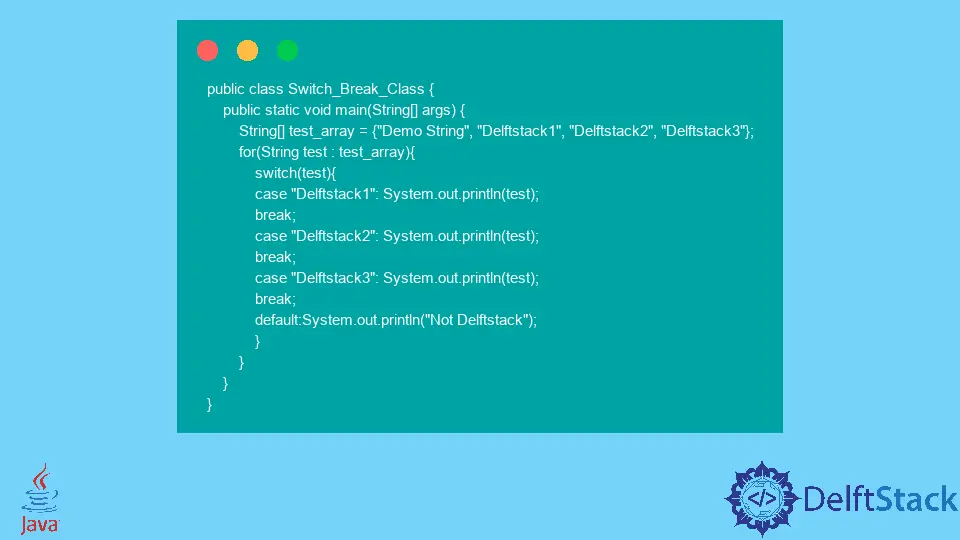Java 中 break 和 continue 语句的区别
-
通过 Java 中的
for循环演示 Break 和 Continue 之间的区别 -
通过 Java 中的
foreach循环演示 Break 和 Continue 之间的区别 - 通过 Java 中的嵌套循环演示 Break 和 Continue 之间的区别
- 演示 Java 中带标签的 break 和带标签的 continue 语句之间的区别
-
演示 Java 中
switch条件中break和continue的使用

本教程将演示 Java 的 break 和 continue 语句之间的区别。
Java 中的 break 语句用于在给定条件下离开循环,而 continue 语句用于在给定条件下跳转循环的迭代。
通过 Java 中的 for 循环演示 Break 和 Continue 之间的区别
请参阅下面的示例,以使用 for 循环区分 break 和 continue。
public class Break_Continue_Class {
public static void main(String args[]) {
System.out.println("The Break Statement: \n");
for (int x = 0; x < 15; x++) {
if (x == 8) {
break;
}
System.out.println(x);
}
System.out.println("The Continue Statement: \n");
for (int x = 0; x < 15; x++) {
if (x == 8) {
continue;
}
System.out.println(x);
}
}
}
输出:
The Break Statement:
0
1
2
3
4
5
6
7
The Continue Statement:
0
1
2
3
4
5
6
7
9
10
11
12
13
14
带有 break 语句的循环在 8 处终止,而带有 continue 的循环在 8 处跳转迭代。对于 while 和 do-while 循环的工作方式类似。
通过 Java 中的 foreach 循环演示 Break 和 Continue 之间的区别
请参阅下面的示例以区分 foreach 循环的 break 和 continue 语句。
public class Break_Continue_Class {
public static void main(String args[]) {
int[] test_array = {0, 1, 2, 3, 4, 5, 6, 7, 8, 9};
System.out.println("The Break statement works in this way: \n");
for (int test : test_array) {
if (test == 5) {
break;
}
System.out.print(test);
System.out.print("\n");
}
System.out.println("The Continue statement works in this way: \n");
for (int test : test_array) {
if (test == 5) {
continue;
}
System.out.print(test);
System.out.print("\n");
}
}
}
输出:
The Break statement works in this way:
0
1
2
3
4
The Continue statement works in this way:
0
1
2
3
4
6
7
8
9
如图所示,带有 break 语句的循环在 5 处终止,带有 continue 的循环在 5 处跳转迭代。
通过 Java 中的嵌套循环演示 Break 和 Continue 之间的区别
下面的示例使用带有 break 和 continue 语句的嵌套 for 循环。
public class Break_Continue_Class {
public static void main(String[] args) {
System.out.println("The Break Statement: \n");
for (int x = 1; x <= 4; x++) {
for (int y = 1; y <= 4; y++) {
if (x == 3 && y == 3) {
break;
}
System.out.println(x + " " + y);
}
}
System.out.println("The Continue Statement: \n");
for (int x = 1; x <= 4; x++) {
for (int y = 1; y <= 4; y++) {
if (x == 3 && y == 3) {
continue;
}
System.out.println(x + " " + y);
}
}
}
}
输出:
The Break Statement:
1 1
1 2
1 3
1 4
2 1
2 2
2 3
2 4
3 1
3 2
4 1
4 2
4 3
4 4
The Continue Statement:
1 1
1 2
1 3
1 4
2 1
2 2
2 3
2 4
3 1
3 2
3 4
4 1
4 2
4 3
4 4
正如我们所见,break 语句仅中断 x 和 y 均为 3 的内部循环,而 continue 语句仅跳过了一次迭代,其中 x 和 y 均为 3。
演示 Java 中带标签的 break 和带标签的 continue 语句之间的区别
未标记的 break 和 continue 语句仅适用于嵌套循环中的最内层循环。这些标签仅用于将声明应用于我们的选择。
class Break_Continue_Labeled {
public static void main(String args[]) {
System.out.println("The Labeled Break Statement: ");
first_break: // First label
for (int x = 0; x < 4; x++) {
second_break: // Second label
for (int y = 0; y < 4; y++) {
if (x == 2 && y == 2) {
// Using break statement with label
break first_break;
}
System.out.println(x + " " + y);
}
}
System.out.println("The Labeled Continue Statement: ");
first_continue: // First label
for (int x = 0; x < 4; x++) {
second_continue: // Second label
for (int y = 0; y < 4; y++) {
if (x == 2 && y == 2) {
// Using break statement with label
continue first_continue;
}
System.out.println(x + " " + y);
}
}
}
}
输出:
The Labeled Break Statement:
0 0
0 1
0 2
0 3
1 0
1 1
1 2
1 3
2 0
2 1
The Labeled Continue Statement:
0 0
0 1
0 2
0 3
1 0
1 1
1 2
1 3
2 0
2 1
3 0
3 1
3 2
3 3
上面的代码使用标签作为第一和第二。如果我们将 first 作为参数传递给语句,它将应用于第一个语句,如果我们传递 second,它将应用于第二个语句。
演示 Java 中 switch 条件中 break 和 continue 的使用
只有 break 语句用于 switch 条件; continue 语句没有用处。
public class Switch_Break_Class {
public static void main(String[] args) {
String[] test_array = {"Demo String", "Delftstack1", "Delftstack2", "Delftstack3"};
for (String test : test_array) {
switch (test) {
case "Delftstack1":
System.out.println(test);
break;
case "Delftstack2":
System.out.println(test);
break;
case "Delftstack3":
System.out.println(test);
break;
default:
System.out.println("Not Delftstack");
}
}
}
}
输出:
Not Delftstack
Delftstack1
Delftstack2
Delftstack3
上面的代码包含三种情况和一种默认情况,它显示了开关条件中的 break 语句。
Sheeraz is a Doctorate fellow in Computer Science at Northwestern Polytechnical University, Xian, China. He has 7 years of Software Development experience in AI, Web, Database, and Desktop technologies. He writes tutorials in Java, PHP, Python, GoLang, R, etc., to help beginners learn the field of Computer Science.
LinkedIn Facebook